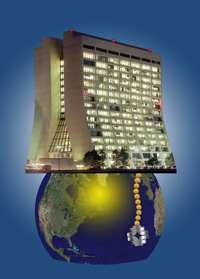High rise lights go out
for Earth Hour
 |
| Fermilab will shut off all nonessential lights in Wilson Hall between 8:30-9:30 p.m. Saturday, March 28, as part of Earth Hour. |
Fermilab's Wilson Hall stands 15 stories above the surrounding prairie, serving as a beacon for the northwestern suburbs.
For one hour on Saturday, March 28, the building will boost its energy conservation efforts by joining businesses, organizations and homes around the world in darkness.
Earth Hour, a global 60 minutes without electricity, delivers a powerful message about the need for action to pull the plug on global warming.
"Turning off the lights in Wilson Hall is a visible reminder that there is an issue that we need to be concerned about," said Rod Walton, Fermilab's ecologist.
All nonessential lights in Wilson Hall will shut off at 8:30 p.m. Lights necessary for safety, such as those in stairwells, and those needed to run experiments will remain on. Those who need to work on Saturday night should try to do so before or after 8:30-9:30 p.m. If you must work during that time, please remember to switch lights off when done. As an extra measure of compliance, all nonessential lights switched on after 8:30 p.m. will shut off again at midnight.
Wilson Hall building manager John Kent hopes that employees will do their part by turning off personal computers, task lights or any other personal electronics before leaving for the weekend.
"We participated as part of Chicago's Earth Hour event last year, which cut the metropolitan area's energy consumption by 7 percent, or 818-megawatt hours, according to ComEd," Walton said.
That is the carbon equivalent of 1.3 pounds of carbon dioxide or taking more than 1 million cars off the road for one hour.
Already this year, nearly 1,600 cities and towns in 80 countries have signed on to participate in this year's event.
"If the entire world does it, we're in good shape," Walton said.
For more information on Earth Hour, visit www.earthhour.org. Building managers interested in participating can contact John Kent, x4753, jwkent@fnal.gov. Contact Rod Walton, x2565, rwalton@fnal.gov or Eric Mieland, x2248, mieland@fnal.gov with questions.
-- Rhianna Wisniewski
|